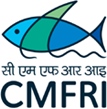Home Biodiversity DIVISION
Thrust Areas of Research:
Development of Indian finfish and shellfish biodiversity knowledge base to foster the assessment of biological diversity of Indian seas.
Biodiversity valuation of marine organisms in selected marine ecosystems along the Indian coast.
Assessment of fishing impacts on biodiversity loss with reference to threatened species and fisheries management.
Monitoring the conservation biology of economically important and threat-prone species and fragile ecosystem.
Development and Maintenance of database of Maine Biodiversity Museum to dissiminate the information on the web to make it easily accessible to all
Ongoing Research Projects:
a. In-house projects :
| Developing conservation plan for biologically sensitive areas along the Indian coast |
| Investigations on the Scyphozoan and Cubozoan jellyfish diversity and distribution along the Indian Coast Research Project |
| Assessment of resilience potential of coral reefs of India Research Project |
| Molecular taxonomy and phylogeny of Cones (cone snails) and Strombs (Mollusca,Gastropoda) of the Indian coast |
b. Externally funded projects :
| Taxonomical Investigation of lesser known marine animals of India Phylum Cnidaria (Class:Anthozoa) and Phylum: Porifera (Marine) |
Completed Research Projects:
| Valuation of marine and coastal ecosystem in Kadalundi Community Reserve of Kerala Biodiversity Board |
| Bioinventorying and Biodiversity Valuation of Marine Organisms in Selected Marine Ecosystems along the Indian Coast |
| Investigations on vulnerable coral reef ecosystem of Indian waters with special emphasis on formulation of management measures for conservation |
| Assessment and valuation of coral reef island ecosystem |
| Significant Achievements in the last two years |
| Enhancing Competitiveness 1. Marine Biodiversity Division of ICAR-CMFRI has developed a first aid kit - Jelly Safe - to treat the wounds caused by the Jelly Stings on the fishers of the south-east coast of India. Traditional fishers were trained in recognising the venomous jellyfishes and how to apply this first aid kit in order to prevent major medical conditions due to the toxic stings. 2. Marine Biodiversity Division of ICAR-CMFRI has trained government staffs from Department of Science and Technology of Lakshadweep Administration on Procedures and Practices for maintenance and up-keeping of Marine Taxonomy Lab/Museum. The trained staffs could successfully implement the practices they have learned from us and initiate the creation of lab and museum activities in their department facility at Kavaratti Island. Improved Governance 1. As per the advisories submitted by ICAR-CMFRI, Tamil Nadu Fisheries Dept and Ramanathapuram District Collector have directed to install information boards and signage on Jellyfish sting prevention and management, along the beaches and landing centres near to the coastal waters of Palk Bay where the Jellyfish occurrence reported. Such advisories not only benefit fishers but also a large number of pilgrims who visit Rameswaram from different parts of the country. The signages were given QR code to link to the multilingual guide on jellyfish sting management in order to get the information through mobile in 9 different languages. Enhanced sustainability and conservation objectives 1. Successful development of the 16 fish cell lines that can help in marine fish virology, toxicology, cytogenetics and gene expression studies. 2. Six new species of sponges Hyattella repandus, Hyattella macrophylla, Hyattella foliata, Hyattella vedalainensis, Hyattella diffusa and Hyattella oblongus, a cone snail Conus laccadivensis and one snake eel Xyrias anjaalai were newly described. 3. Two species of Acroporid corals Acropora cf. polystoma and Acropora efflorescens were reported for the first time from the western coast of India 4. Redescription of the jellyfish, Crambionella annandalei (Cnidaria: Scyphozoa) from Indian waters 5. CATALOGUE-2018 Marine Biodiversity Museum CMFRI Special Publication No. 129 6. Investigations on the migratory and breeding seabirds in the Indian waters and their interaction with fishery. |
Significant Achievements in the past years
Technologies/Concepts/Findings
- Technologies developed for the propagation of Sinularia kavarattiensis in the laboratory and in open sea
- Technologies developed for the propagation of soft corals – Cladiella laciniosa, Dampia pocilloporaeformis and Lobophytum pauciflorum in the laboratory
- Technologies for the propogation of sponges and hard coral were developed
- Deep-sea sponge species new to science (Semperellame galoxea sp. nov.) reported from Andaman waters : Registered in World Porifera Database (WPD) and World Register of Marine Species (WORMS)
- Four species of corals, Acropora thomasi, A. valamunensis, A. mannarensis and A. josephi new to science described.
- Bleekeria murtii – A fish species new to science described
- A unique bacterial strain C29 isolated from Porites sp. from Vizhinjam was subjected to 16S rRNA gene sequencing and blast search. This strain was found to be a potential novel genus showing similarity to Fabibacter halotolerans under the family Flexibacteraceae
- Herbarium of 85 species of seaweeds from GOMBR was developed
- New distributional records reported from Indian seas:
- Home
- COVID-19 Advisories
- Director's Message
- Centre of Excellence (Dr.EGS - CoEI)
- CMFRI in Media
- MFIS
- Latest Research Findings
- Fish Catch Estimates
- Infographics
- Fished Taxa Listing
- CMFRI Nutraceuticals
- Training Courses
- Job Opportunities
- Tenders
- Patents
- Awards
- Fish Seed for Sale
- Museum
- KVK / Services / Swachh Bharat
- Staff
- Consultancy
- CMFRI Theme Song
- Downloads
- Official Language
- Right to Information
- Public Interest Disclosure & Protection of Informers (PIDPI)
- Links
EVENT CALENDAR
May 2024







